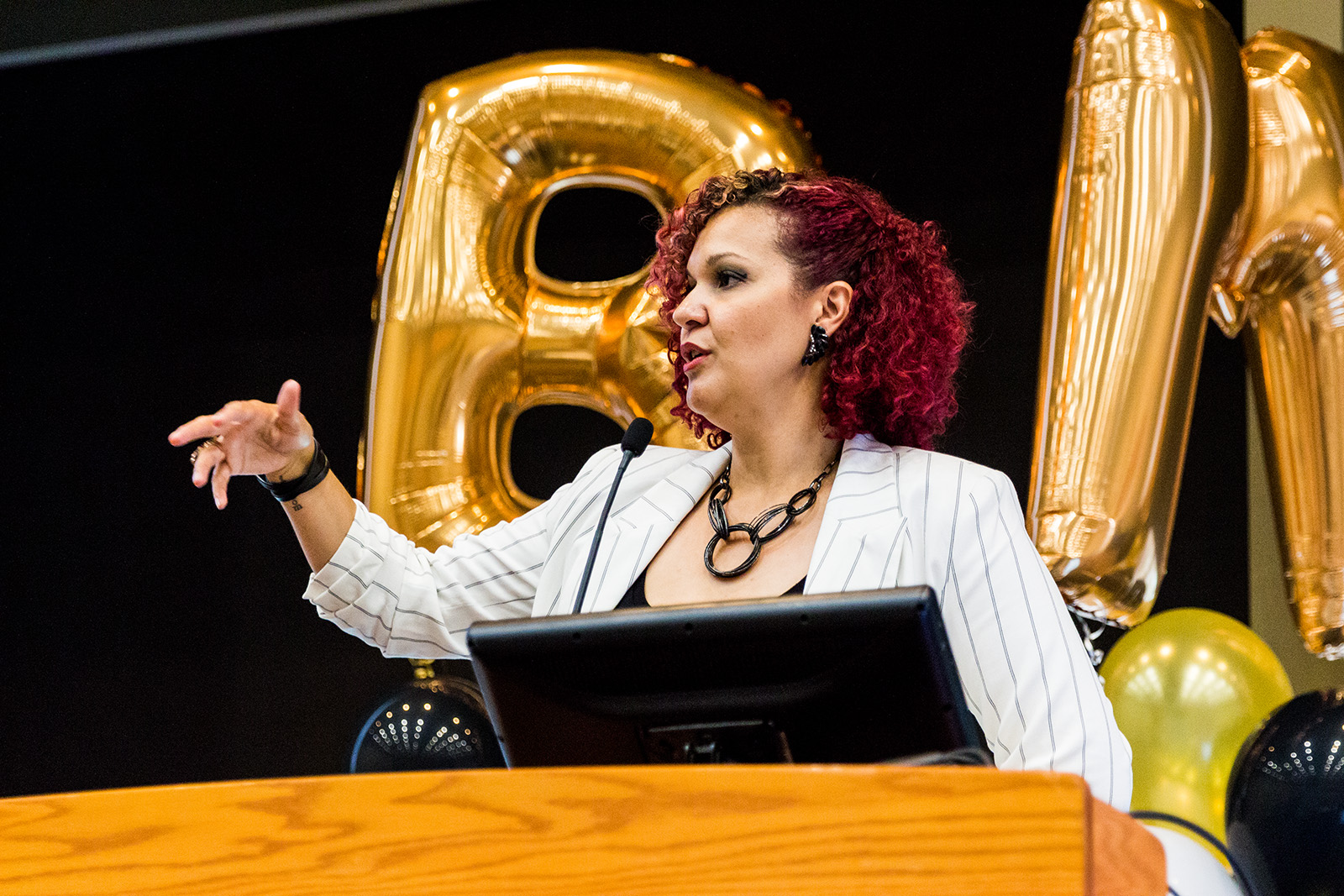UCLA’s Black Male Institute branches out efforts to support black women

Samarah Blackmon, the associate director of UCLA’s Black Male Institute, said she believes it is time for the institute to focus more on helping black women and encouraged the audience members to find ways to support them. (Jenna Smith/Daily Bruin)
By Megan Daley
May 4, 2018 12:17 a.m.
After spending 10 years researching black male students’ academic successes, an institute on campus is expanding to support the academic well-being of black female students.
UCLA’s Black Male Institute held its 10th annual Think Tank in Carnesale Commons on Thursday. The event reflected on BMI’s 10-year history and its goals today to address issues, such as access to quality education, that are intersectional among communities of color across Los Angeles.
Tyrone Howard, the director and founder of BMI and the associate dean for equity and inclusion at the UCLA Graduate School of Education and Information Studies, said while BMI was founded to research issues surrounding black male youth’s academic achievements, the institute will broaden its research projects to include issues concerning black female students, such as their higher rates of suspension in schools and juvenile incarceration compared to their white counterparts.
“It’s okay, appropriate and acceptable for us to expand our paradigm so we can study, understand and learn both the experiences of our young boys and our young girls,” Howard said.
Kimberlé Crenshaw, the keynote speaker at the event and a distinguished professor of law at UCLA, said black women face discrimination based on both their race and gender. Issues she said she thinks society needs to immediately address are the prevalence of sexual violence against black women, the wariness of the public to believe victims and the failure of courts to punish perpetrators.
“Last week alone, you had Bill Cosby, Camille Cosby and R. Kelly and a bunch of other people basically marginalize black women who’ve experienced sexual abuse and assault under the framework of ‘This is all a high-tech lynching,’” Crenshaw said.
Bill Cosby was found guilty last week of three counts of aggravated indecent assault and rapper R. Kelly has been accused of having sexual relations with minors.
These recent high-profile cases reflect the trend of black women being left out of efforts, such as those of the women’s and civil rights movements, to help marginalized groups, Crenshaw said. She added that black women who claim they have been sexually assaulted are often not believed.
“Something tells us that we can handle the trauma and the marginalization and the destitution in ways that our male counterparts can’t,” she added. “We are at the center of this conversation, so what is it that makes it happen?”
When BMI launched in 2009, it focused on researching and providing more effective academic opportunities for black male students, such as through the program Building a Lifetime of Options and Opportunities for Men, Howard said. The initiative focused on helping formerly incarcerated black youth from ages 14 to 18 reassimilate into their communities.
“The entire goal of the project was to see if you connected these men to resources, can you reduce the recidivism rate?” Howard said. “Oftentimes, they reoffend within a six-month window.”
In the program’s third year, 82 percent of BLOOM participants did not reoffend. Howard credits the program’s success to the mentors who helped participants reintegrate into their schools, homes and communities.
He added BMI plans to develop research projects that uplift women of color in all aspects of life, including education. The “Gateway-to-Graduation” project is looking at academic retention for both black men and women at UCLA. This project includes “Sister-to-Sister,” a program that supports black female students by providing classes on identity and mental health, and “Blacklimated,” which helps first-year and transfer black male students adjust to campus life through classes on topics including research and community building.
“It’s about expanding our work to ask the same questions that we’ve been asking about black boys around discipline, around achievement, around persistence and ask those same questions around black girls,” Howard said.
Samarah Blackmon, the associate director of BMI, also said she believes it is time for the institute to focus more on helping black women and encouraged the audience members to find ways to support them.
“They need us. I mean, they just need us,” Blackmon said. “I think the ways in which black girls have been neglected have yet to even be realized.”


